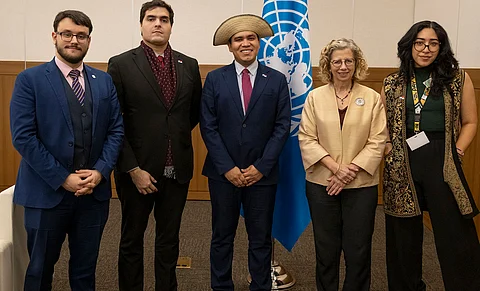

The fifth Intergovernmental Negotiating Committee session (INC-5) on ending plastic pollution through a global plastic treaty started on November 25. Here is a look at what happened on the fourth day of the meet. Also read the diary for November 25, November 26 and November 27.
In Contact Group (CG) 1 which deals with chemicals, supply and products, member states worked to define a few basic terminologies like ‘plastic pollution’, ‘plastic waste’ and the ‘life cycle’ of plastic. Many countries disagreed on the definitions proposed by the United Nations Environment Programme in its documents released in earlier INC meetings. Some countries tried to limit the definition of ‘plastic pollution’ to ‘plastic waste’. It was also said that only a few terminologies should be defined by the committee, the ones that actually need to be defined.
In the latter half of the day, the committee worked on the streamlined text that was shared by the co-chairs of the contact group for product design (Article 5) and plastic products (Article 3). Due to disagreement around the chemicals of concern which is blocked by a handful of countries, Article 3 was split up into 2 sections: one on plastic products and the other one on chemicals of concern.
Brazil and South Korea took to informal meetings to develop a text that took all the proposals in consideration. This was discussed in the last meeting before the CGs broke and went to Bureau meetings. The issue of chemicals of concerns could not be discussed.
Panama led a cross-regional proposal for a comprehensive strategy to reduce global plastic production through a systematic, adaptive approach with a global target addressing the entire plastics lifecycle.
In CG 3 (finance), Hungary, on behalf of the European Union, proposed increased financing for activities to prevent or reduce plastic, plastic products, and microplastic emissions into the environment. The proposal drew attention to the need to develop effective reuse systems and adequate waste management infrastructure.
In CG 4 (objective, scope, principles, and preamble), Samoa, on behalf of the Small Island Developing States (SIDS), introduced a written proposal to establish a subsidiary body for scientific, technical, economic, cultural, and social advice.
As many as 16 joint and independent submissions were received which proposed the way forward for the scope and principles of the future instrument. While some countries continue to believe the scope of the future instrument is well-defined in the resolution 5/14, many including India proposed a new text for the scope and definition of the plastic life cycle to protect their economic interests.
Some countries insisted on limiting the right to vote on substantial matters. Some also pushed for increasing the number of Parties needed to ratify the treaty.
Three CGs were scheduled in parallel, making it challenging for small delegations to participate.
Small countries have been unhappy about three CGs sitting concurrently, due to the limited size of their delegations. Some member states have just two people in Busan. For them, attending three CGs at one time is impossible.
US-based industry association NAPCOR, which represents nearly 70 companies that deal in Polyethylene terephthalate or PET plastic used for soft drink bottles, has been behind a campaign that misled consumers with paid TikTok and Facebook content, it has been revealed at Busan.
NAPCOR held a session for delegates and observers earlier in the week at INC-5 where it advocated for PET over aluminium and glass.
The International Pollutants Elimination Network released two new studies on November 28. The first showed that Thai workers in the plastic waste industry are more exposed to harmful chemicals than workers in other industries. The second showed that even UN officials are exposed to chemicals linked to hormone disruption and other health issues.
Several scientists working on plastics have felt unsafe and harassed by alleged aggressive industry lobbying, according to a new investigation.
The harassment includes verbal attacks at conferences, online abuse and being filmed and photographed at industry events. Some even say this has made them afraid of publishing research on certain topics.
Academics have identified five fairness flaws in the Global Plastics Treaty. They have called for the text to humanise plastics and promote decent work, end waste colonialism, transition to socially just, sustainable and circular plastics, ensure enforcement, compliance and accountability, and complete the cleanup needed to tackle decades of mounting plastic waste.
Luis Vayas Valdivieso, INC chair, distributed a procedure to “accelerate progress and foster consensus” due to the lack of progress in the CGs.
The CGs should have finalised their work by 9 pm local time on November 28 night, according to the 2-page document, before the co-chairs of each CG submitted the text to the chair, who was to present a new non paper to members by noon on November 28.
The non paper will then be considered in plenary either on November 29 afternoon or November 30 morning before being sent to the Legal Drafting Groups for legal review.
For “persistent divergencies” in the text, “informal consultations or Friends of the Chair meetings may also be convened to consider how to proceed.”
The text the INC Chair compiles from the CGs will be “the battleground of the final showdown of the plastics treaty talks,” according to Norwegian academic Magnus Løvold, author of a series of detailed accounts throughout the INC process
He adds that “spoilers do what spoilers must: derail, delay, distract and divide… the progressive majority must break free from precedent and move to conclude the treaty without them.”
With inputs from Break Free From Plastic (BFFP) and Global Strategic Communications Council (GSCC)